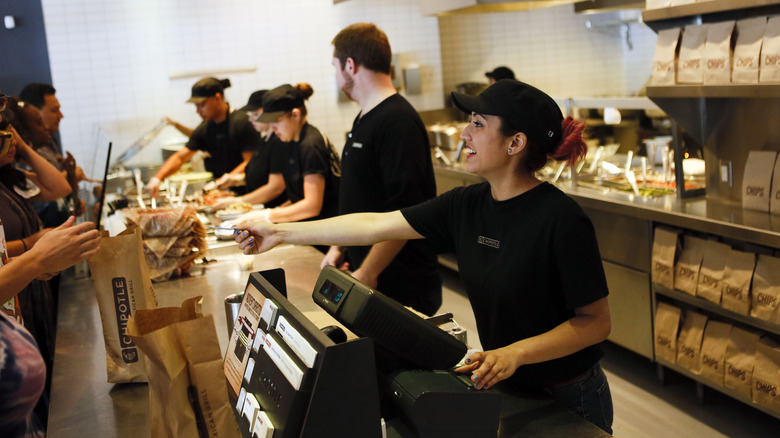The Main Difference Between Chipotle And Qdoba, Explained
Fast service and casual dining restaurants have come a long way over the years. While burgers and fries were once standard selections throughout most establishments, diners can now enjoy a wider variety of tasty, convenient fare whenever they wish. Take Chipotle and Qdoba, for instance. These chains both feature delicious Tex Mex-style offerings made with fresh, wholesome ingredients. As a result, they're beloved by patrons and continue to expand within their respective markets.
There is a bit of rivalry between the two establishments given how similar they are in the eyes of the public. A taste test conducted by Insider found the restaurants to be very comparable in terms of price, quality, and quantity, although the poll did find Qdoba edging slightly ahead of Chipotle. However, the chains do have some significant differences between them, and understanding these differences can help diners make the right selection when it comes to lunch and dinner offerings.
Bigger selection at Qdoba means higher prices
According to the restaurant's about us page, Qdoba got its start as Zuma Fresh Mexican Grill with a single Denver location in 1995. A re-branding effort in 1999 resulted in the establishment's current name, and by 2011 the chain had opened its 600th store. Qdoba's locations page now lists 736 establishments throughout the US, which is considerably smaller than Chipotle's 3,077 US locations, per ScrapeHero. While it doesn't have the reach of Chipotle, Qdoba has garnered many loyal fans thanks to its wide selection of food. Its printable menu lists many tasty items, including three-cheese nachos, a variety of salsa flavors, and sweet treats for after your meal (as compared to Chipotle's lack of a dessert menu).
A wider selection also means a higher cost. For comparison, consider the prices for a simple chicken burrito at each establishment. At Qdoba, the grilled adobo chicken burrito is $9.85 and includes rice, beans, salsa, and assorted toppings. You also get your choice of queso and guacamole at no extra charge. As for Chipotle's chicken burrito, you'll pay just $7.85 for a similar combination of ingredients when it comes to the rice, beans, and veggies, though queso and guacamole do incur an additional fee. Despite these add-ons, Chipotle's consistently low prices are one of its primary selling points.
Low prices and high quality make Chipotle quite appealing
Per CNBC, the very first Chipotle Mexican Grill was founded in Denver in 1993, two years before Qdoba's opening. Founder Steve Ells hoped sales from this modest "burrito shop" would offset costs related to the opening of a traditional dining establishment in San Francisco. However, Chipotle quickly rose in popularity and subsequent locations were opened in Denver before the chain expanded to the rest of the nation.
The restaurant's success can be attributed to its commitment to quality, as listed on the core values page. This entails working with farms that use humane, sustainable practices, whether growing produce or rearing animals. Additionally, the chain forgoes the use of additives or hormones in its products. Because Chipotle's fare contains higher quality ingredients, one would think the establishment could stand to charge more for their menu items. And according to Food Business News, Chipotle has raised prices in about 700 restaurants to counter what its chief financial officer referred to as "pockets of outsized wage inflation." Despite the recent price hike, the establishment claims its sales figures are stronger than ever and anticipate continued success in the future.


